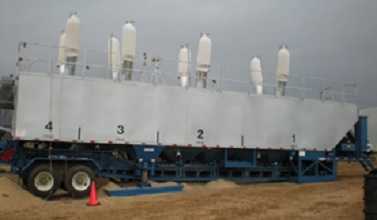NIOSH-Designed Technology Can Reduce Workers’ Exposure to Silica at Hydraulic Fracturing Sites
November 4, 2015
NIOSH Update:
Contact: Stephanie Stevens (202) 245-0641

Credit: Mike Gressel (ret.) and Jerry Kratzer, NIOSH. Field testing of the second-generation mini-baghouse.
Researchers at the National Institute for Occupational Safety and Health (NIOSH) have developed and tested a prototype called the “mini-baghouse” that can protect oil and gas extraction workers by effectively controlling silica dust at hydraulic fracturing worksites. Research on the mini-baghouse will be presented November 4, 2015 at the American Public Health Association’s annual meeting in Chicago.
Silica is a human carcinogen, and exposure to silica is known to cause silicosis, a disabling, non-reversible, and sometimes fatal lung disease. Exposure to respirable crystalline silica at oil and gas extraction sites is a documented risk to workers. In a 2013 study, NIOSH researchers found that some workers who work around sand moving machinery were exposed to silica at levels that exceeded all relevant occupational health criteria.
The NIOSH mini-baghouse retrofit assembly was designed to control dust emissions from thief hatches on top of sand movers—a major source of silica dust. Working with private industry, NIOSH researchers field-tested the prototype, collecting nearly 200 air samples in 12 locations on and around a sand mover, both with and without the mini-baghouse. Results from the evaluation found that the mini-baghouse reduced the amount of airborne respirable crystalline silica by 79-99%.
Researchers also analyzed the dust collected by the mini-baghouse and determined that the particles captured were extremely fine (1-2 microns in diameter). This type of dust is highly respirable and can penetrate deep into the lungs. Researchers also determined the dust was freshly fractured quartz, which is a particularly hazardous form of respirable crystalline silica.
In early 2015, NIOSH researchers tested a new and improved 3rd generation mini-baghouse that features design enhancements including improved baghouse material and a dust-release coating. NIOSH is now seeking additional industry partners to help advance this novel, potentially life-saving technology and help bring it to market through a commercial licensing agreement.
NIOSH is the federal agency that conducts research and makes recommendations for preventing work-related injuries, illnesses, and deaths. For more information about NIOSH visit www.cdc.gov/niosh/.
- Page last reviewed: November 4, 2015
- Page last updated: November 4, 2015
- Content source:
- National Institute for Occupational Safety and Health Education and Information Division


 ShareCompartir
ShareCompartir